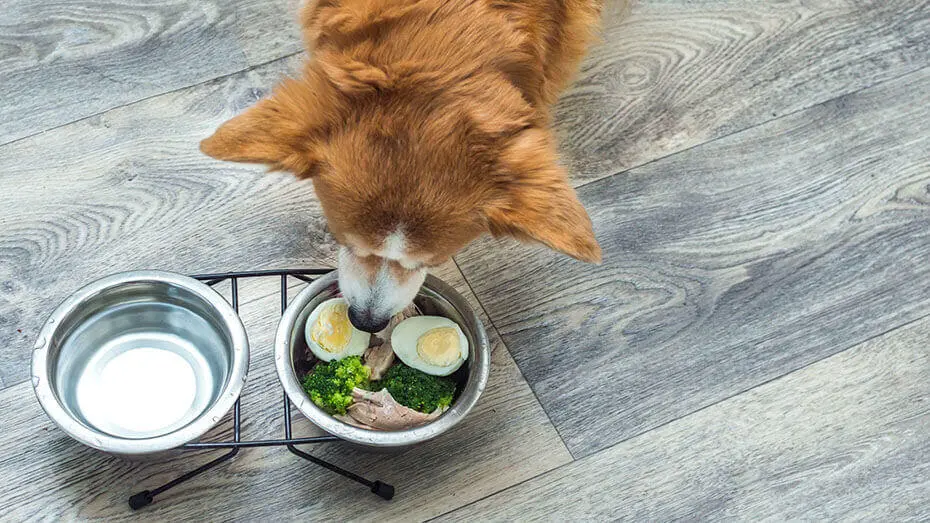It’s no surprise that people are becoming more interested in making their own dog food for their pets, since we all want the best for our canine companions. Learn all you need to know about home-prepared dog food and why it’s better to get professional guidance before feeding your pet homemade meals.
Food is the way to (most) dogs’ hearts, and because our dogs are our dearest friends and members of the family, it’s only natural that we wonder whether we may include them in our family dinners. However, making dog food at home isn’t as simple as simply making an extra serving of whatever you’re eating. It’s up to you to make sure that whatever you’re preparing is healthy and satisfies your pet’s dietary needs. This means you shouldn’t make any drastic dietary changes to your pet’s current regimen without first discussing it with a veterinarian or pet nutritionist. Keep reading to learn all you need to know about cooking for your dog at home.
Is it better to make your own dog food?
As a rule, no! The American Kennel Club reports that many veterinarians do not think that giving homemade food to dogs is preferable to a commercially prepared diet. Currently, there is little data to demonstrate that homemade dog food has any advantages over commercially available dry or wet foods. In fact, veterinarians are concerned that homemade dog food may be harmful to the health of dogs if the diets aren’t properly planned or developed without the assistance of a qualified nutritionist or veterinarian.
Is there any logic to making one’s own dog food?
You get to decide exactly what goes into your dog’s food, giving you more power over his health.
As you can exclude the substances that have previously caused your dog digestive distress, home-prepared meals may be helpful in the treatment of food intolerances. There are a lot of professionally prepared dog diets out there that may help with allergy and intolerance management, so you probably won’t have to make the move only for that.

Is there any way to know how dangerous it is?
Dogs might develop health problems because of the lack of essential nutrients in certain dog food recipes.
Because they aren’t formulated by trained nutritionists or veterinarians, homemade dog food recipes may often include either too much or too little of potentially harmful ingredients.
If you don’t have an item on hand but still want to make a dish, it might be tempting to substitute something else, but doing so can throw off your diet’s nutritional balance.
Raw meat and eggs pose a health concern to your dog since they may be infested with parasites or germs like Salmonella. Cleaning up after your pet or preparing their food poses a danger of spreading these bacterial diseases to you.
Because of this, many home-fed dogs end up either too full or too hungry.
In light of the above, if you’re set on making your dog’s food at home, it’s essential that you get the advice of a veterinarian or a dog nutritionist to make sure your pet stays healthy. We also advise only attempting homemade dog food recipes developed by a specialist with established credentials in the field. Keep in mind that anybody with an internet connection may present themselves as an expert; do your homework on the writers.
What should be included in a homemade dog food recipe?
Your dog, like you and me, requires a variety of nutrients to be healthy and happy. These include protein, fat, carbs, fiber, and essential fatty acids. In addition, canines require several micronutrients, such as vitamins and minerals. Even though the diet is packed with healthy ingredients, the nutrients must be in the appropriate proportions for optimal health. This is why it’s so challenging to provide for a dog’s nutritional needs, and why it’s best to seek expert guidance when creating a homemade diet.
Is there anything you should never put into homemade dog food?
Numerous common human meals are toxic to dogs and should never be given to them. When making your own dog food, try to stay away from these ingredients:
Allium vegetables like onions, garlic, and chives may induce stomach upset and even harm to red blood cells.
Theobromine, which is found in chocolate, is very poisonous to dogs and may lead to a variety of symptoms including gastrointestinal distress, cardiac issues, and poisoning to the central nervous system.
Avoid feeding your dog macadamia nuts because of the toxic effects they may have on his muscles and neurological system.
Ingesting avocados may make you sick to your stomach and bowels, and its Persin content has been related to cardiovascular issues.
Xylitol is a common artificial sweetener in peanut butter, but it may induce low blood sugar and even liver damage if consumed in large amounts over time.
Dogs may be severely harmed by simply a single drink of alcohol. Sickness, diarrhea, and clumsiness are only some of the symptoms of alcohol poisoning; in more extreme situations, seizures and coma may occur as well.
Bones that have been cooked pose serious health risks to dogs, including choking, splintering, and intestinal perforation. Grapes and raisins are very toxic to dogs and may lead to life-threatening liver failure.